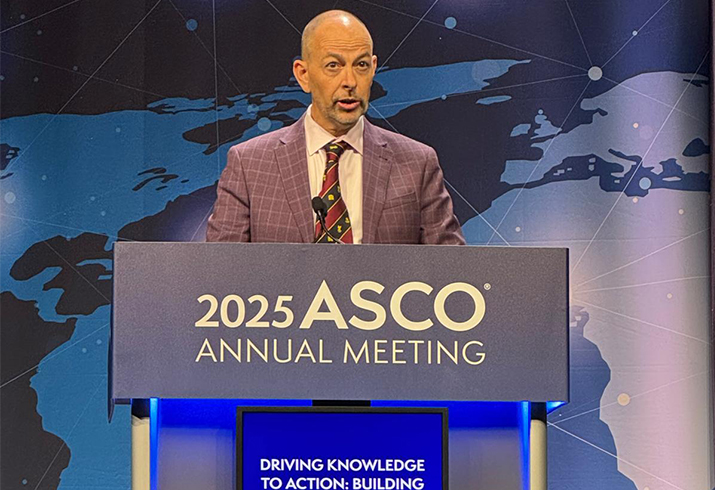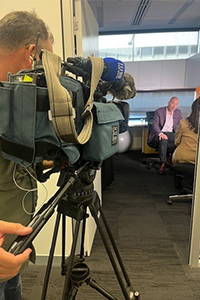Landmark international bladder cancer trial

A new treatment option trialled in Western Australia (WA) for people with high-risk bladder cancer has the potential to transform care for patients worldwide.
Led by the Australian and New Zealand Urogenital and Prostate Cancer Trials Group (ANZUP) in collaboration with the NHMRC Clinical Trials Centre at the University of Sydney, the clinical trial known as ANZUP 1301 offers a lifeline to patients amid a worldwide shortage of BCG.
Head of Urology at Fiona Stanley Hospital (FSH) and lead investigator for the international clinical trial, Professor Dickon Hayne, presented the decade long findings at the 2025 American Society of Clinical Oncology (ASCO) Annual Meeting in Chicago last week.
“Adopting this regimen could dramatically expand access to life-saving bladder cancer treatment and help ensure more patients receive the care they deserve,” Dickon said.
“By adding an extra cancer-fighting drug, mitomycin (MM), to the standard bladder cancer immune therapy (BCG), researchers have found an effective new combination that can treat more patients in a safer and more effective way.
“Our findings show that BCG-MM is a safe and effective treatment alternative to BCG alone, with the added benefit of requiring 40 per cent fewer doses of BCG.
“For over 50 years, BCG has been the gold standard for treating this type of bladder cancer but a global shortage means up to 50 per cent of patients who require this therapy are missing out.
“BCG-MM offers a practical, scalable solution to help more people receive effective treatment by improving accessibility especially in regional areas and for older Australians.
“The new combination bladder cancer treatment may reduce the number of patients with high-risk, non-muscle-invasive bladder cancer who will need to have their bladder removed, or treated by radiation and chemotherapy, ultimately saving lives.”
ANZUP 1301 was the largest randomised study in the bladder cancer field in the past decade with 501 patients across 17 sites in Australia and the United Kingdom.
FSH was the biggest trial recruiter worldwide with participants ranging in age from 20 to 96 years old.
The youngest person to take part in the trial, Jack Taylor, was just 20 years old when he was diagnosed with bladder cancer.
“There weren’t many symptoms, I only noticed blood in my urine just the once,” Jack said.
“I made an appointment to see my GP and after further testing, I was told I had high-grade bladder cancer.
“It was the last thing I expected given my age – I was really shocked and uncertain about what it meant for my future.”
A future for Jack that had only just begun as he was a few weeks into starting at medical school.
Highly unusual in someone so young and with no family history, Jack had a procedure to remove the tumour and was recommended for the clinical trial in mid-2022.
“I had 18 installations over the course of a year - treatments started weekly for nine weeks then changed to monthly for nine months,” Jack said.
“Given I was receiving less BCG through the trial treatment, there were fewer side effects and I was still able to continue with my studies.
“It’s been a very valuable experience seeing what it’s like on the other side as a patient and I have a much greater appreciation of the patient experience which will only add to my professional career as a future doctor.”
Now in his final year of medical school Jack is looking forward to what the future holds, and while he is currently undergoing treatment for a recurrence of the cancer, he is very grateful to have had access to the trial and to see local research benefitting patients like himself across the world.
“It’s so important, both for clinicians and patients, to have high quality research happening here in WA so that patients have more choice and access to world class treatment.”
Watch the Channel 9 news coverage below
Keep up to date with our news and achievements
Find out more on Facebook (external site) or LinkedIn (external site)


